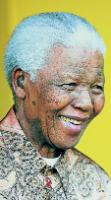
IN MODERN democracies most people accept that there must be leadership. However, in this era, meanings of leadership and the quality of leaders is an issue with which most societies grapple.
Leadership is a relational concept, meaning that unlike during the time of slavery or feudalism, leaders do not have “permanent followers”. Leaders are not unchangeable. They occupy the position through a relationship with those whom they are assigned to represent and leaders can be removed. Followers can become leaders.
The original meaning of democracy, which has some resonance in South Africa, especially through experience in the 1980s, referred to direct democracy. This was not acting through representatives, but direct action by the populace.
For many people there remains a desire not only for a leadership to perform on their behalf, carrying out their mandate, but also for the people of the country to be involved, to be heard and to play a role in driving democratic development.
This was recognised in the notion of leadership articulated in 1994 as “people driven” and “people centred”. The citizens of the country were not meant to be passive observers or merely recipients of “services”. That is not to say that addressing their hardships was not central. “People centred” meant that the needs of those oppressed under apartheid were to be the primary focus of government.
That was also specified in the constitution adopted in 1996, specifying the obligation to meet “basic needs”.
In this context, a leader needs to have integrity. S/he needs to earn the trust of those who are led.
Where trust is broken, and where a leader proves unreliable, even if she or he continues to hold the position by virtue of election, it does not necessarily mean that person has in fact carried out the function of leadership in the real sense of the concept.
When Nelson Mandela was president, he was clearly trusted and embodied in his own life, both as a freedom fighter and after he became president, the values that he espoused.
He did not declare himself in favour of certain values without living them in his own practices. Mandela sought nothing for himself. He retired from the presidency after only one term. He did not amass a fortune and whatever he acquired was entirely above board.
In short, his life set an example of abiding by the values of democracy and the provisions of the constitution. He continually demonstrated that he shared the pain of the people whom he represented and which he sought to alleviate.
Mandela also understood, long before he became president, even when he was a young lawyer, that it was important to listen carefully and not simply summarise the hardships of others.
Much of his life before prison, in prison and after prison was spent listening to others.
When he took action to remedy what hurt them, he did so with an intimate knowledge of what they experienced, not on the basis of some shorthand or abstract version.
When Mandela saw people who suffered loss or experienced indignity one could see that he embraced their pain.
Clearly there is a problem of trust that lies at the root of current disquiet about leadership. People do not believe in the integrity of leadership.
There is considerable evidence to show that leaders at all levels do not operate in good faith to better the lives of the poorest of the poor.
In fact, the recent auditor general’s report on local government showed not only overwhelming evidence of misspending in local government but that very few people were held accountable for diversion of massive funding meant for the poor.
There is no need to rehearse the various irregularities that characterise the current presidency. What is clear is that President Jacob Zuma demonstrates no intention to abide by constitutional obligations where these interfere with what is personally beneficial. He defies constitutional obligations to respond to findings that he was enriched in the Public Protector’s report on improvements to his private estate.
He has chosen to have recourse to separate investigations, which cannot constitutionally be treated as an alternative to abiding by her findings.
The example at the top is connived in by the leadership as a whole.
Through their consent, the constitutional state, which is the guarantee of our freedom, is being undermined by patronage, corruption, violence and various other attacks on democratic life.
When the time comes for the replacement of Zuma, we cannot breathe a sigh of relief unless we have identified the frameworks and relationships that have made pillage of the state possible from top to bottom.
We cannot rely on simply using the words “ethical governance” or zero tolerance of wrongdoing.
We need to recognise that legality has been attacked and needs to be restored.
The current parliament, including opposition parties, has not demonstrated the willpower to restore constitutional government.
Citizens themselves need to unite to reclaim their hard-won democratic rights, which are now being squandered.
Article by: RAYMOND SUTTNER
Article Source: Daily Dispatch
